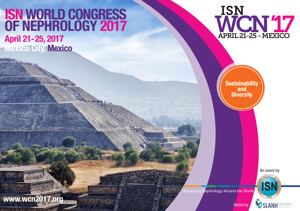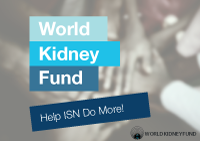Welcome to the ISN Blog
This space is dedicated to the activities of ISN Leaders and Committee Members. Follow them and find out how they are supporting local medical communities in developing countries. From sharing their knowledge, providing guidance to training other nephrologists, you can find out how they are making a difference and helping advance kidney care and research worldwide.
Bernadette Thomas traveled to Phnom Penh, Cambodia for an educational site visit and evaluated the possibility of carrying out an acute kidney injury incidence study. This blog post details the outcome of her trip.
Medical Students who are at the end of their medical training assembled for two teaching sessions over two consecutive days. Day one involved a two-hour lecture on the utility of urine microscopy for evaluating and constructing a differential for acute and chronic kidney disease.
This blog post is provided by Paula Orlandi, Naohiko Fujii, Lisa Nessel, Harold I. Feldman.
The International Network for Chronic Kidney Disease Cohort Studies (iNET-CKD) links chronic kidney disease (CKD) cohorts from all over the world to promote research on this rapidly growing public health issue. It is supported by the International Society of Nephrology (ISN) and currently comprises of 14 cohort studies, representing patients from more than 20 developed and developing countries. New cohort study members continue to join the network.
This blog post is provided by Elwaleed Elhassan from Wayne State University School of Medicine and Secretary General of the Sundanese American Medical Association (SAMA).
Sudan is the third largest country in Africa, with a population of about 30 million. There is no national renal registry but end-stage renal disease (ESRD) is estimated to affect 5,400 new cases per year.
In collaboration with ISN’s Dialysis Committee, ISN Education is launching a new series of webinars focused on prominent themes in dialysis in 2016 and 2017.
Detlef Schlondorff announced recently that he will be stepping down as Editor of Kidney International from the end of 2017. Under his leadership ISN’s flagship journal has continued to grow in impact and in appeal to its global readership.
Adeera Levin, Marcello Tonelli and David Harris represented ISN at a three-day workshop sponsored by the World Health Organization (WHO), which took place in April in Colombo and focused on the epidemic of chronic kidney disease of unknown etiology (CKDu). This is afflicting a large number of agricultural workers in Sri Lanka, particularly in the North and Central provinces.
 A study undertaken during 2015 at Queen Elizabeth Central Hospital (QECH), Blantyre, Malawi demonstrated that 20% of general medical admissions over a three-month period had evidence of kidney disease. Outcome (hospital mortality) in these patients was significantly worse than those with normal renal function.
A study undertaken during 2015 at Queen Elizabeth Central Hospital (QECH), Blantyre, Malawi demonstrated that 20% of general medical admissions over a three-month period had evidence of kidney disease. Outcome (hospital mortality) in these patients was significantly worse than those with normal renal function.
 A dialysis patient referred me to this article from The Atlantic. Published in 2010 but still worth reading. The ISN is all about closing gaps in the provision of kidney care worldwide, but when we think of “gaps”, we tend to think of emerging countries, places in Africa or the poorest parts of Asia and Latin America. However, as the article recounts, there are significant gaps in the provision of dialysis even in the United States. Please do read this excellent story, which includes words from ISN past president, dr. Giuseppe Remuzzi, among others.
A dialysis patient referred me to this article from The Atlantic. Published in 2010 but still worth reading. The ISN is all about closing gaps in the provision of kidney care worldwide, but when we think of “gaps”, we tend to think of emerging countries, places in Africa or the poorest parts of Asia and Latin America. However, as the article recounts, there are significant gaps in the provision of dialysis even in the United States. Please do read this excellent story, which includes words from ISN past president, dr. Giuseppe Remuzzi, among others.
http://www.theatlantic.com/magazine/archive/2010/12/-god-help-you-youre-on-dialysis/308308/
Having returned from spending a month working with the renal team Queen Elizabeth Hospital in Blantyre, Malawi, I wanted to blog about what nephrologists and nephrology researchers are up against in the country. I had the pleasure of working with a dedicated team of people on a current research study focusing on children suffering from acute kidney injury in Malawi.
 Kidney International Reports, an official journal of the International Society of Nephrology, is a peer-reviewed, open access journal devoted to the publication of leading research and developments related to kidney disease.
Kidney International Reports, an official journal of the International Society of Nephrology, is a peer-reviewed, open access journal devoted to the publication of leading research and developments related to kidney disease.
More…
Wednesday, 30 March 2016 08:37
New review study identifies barriers to access to care for acute kidney injury in sub-Saharan Africa
Access to diagnosis and dialysis for acute kidney injury can be life-saving, but can be prohibitively expensive in low-income settings. The burden of acute kidney injury in sub-Saharan Africa is presumably high but remains unknown. The authors of this study did a systematic review to assess outcomes of acute kidney injury in sub-Saharan Africa and identify barriers to care.
Having discussed the influence of lifestyle modification on prevention of chronic kidney disease in previous columns extensively, I will now turn my attention to its effect on prevention of kidney stones. Almost five percent of adults in the US suffer from kidney stones, with more than half having multiple recurrences. Patients end up in the emergency room experiencing agonizing pain and many undergo multiple procedures to remove them by lithotripsy or surgery.
This ISN Blog post is provided by Rezvi Sheriff at the Western Hospital, Sri Lanka following this year’s World Kidney Day celebrations.
Western Hospital in Borella, Sri Lanka conducted a special program to mark the 11th World Kidney Day on March 10, 2016.
Monday, 21 March 2016 15:35
STOP KIDNEY DISEASE INITIATIVE – the effect of diet on CKD
By Alok Agrawal
Chronic Kidney Disease (CKD) is the fastest growing chronic non-communicable disease caused by modifiable lifestyle risk factors as discussed previously, CLICK HERE. It is important to highlight the effect of dietary habits on the onset and progression of CKD.



